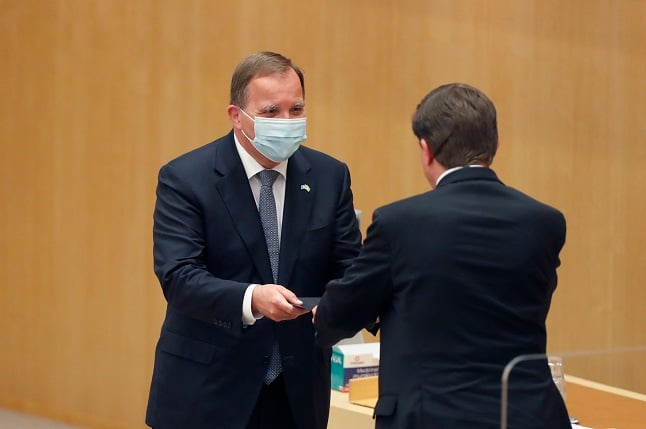He passed the parliamentary vote on Wednesday with 176 members of parliament either voting in favour of his return to office or abstaining from the vote.
“Parliament has put its trust in me to continue leading in Sweden. I take on this task with determination and respect,” the returning PM told media at a press conference.
The system required a majority (at least 175) to not vote against him, rather than needing a majority of ‘yes’ votes; in other words, abstentions effectively worked as votes in favour.
To reach that majority, Löfven received votes in favour from members of the governing Social Democrat and Green parties (116 votes in total) while the Centre and Left Parties (58 votes) abstained, as did one former Left Party MP who is now politically independent. In addition, one member of the Liberal Party voted against her party line and abstained from the vote.
A total of 173 MPs voted against Löfven’s reinstatement as prime minister, including the Moderates, Sweden Democrats, and most Liberal Party MPs.
The vote was called after Löfven became Sweden’s first ever prime minister to lose a vote of no confidence after the Social Democrats’ long-term ally the Left Party (which was opposed to suggested changes to Swedish rental laws) sided with the right-wing opposition to topple the government. Löfven opted to resign rather than call a snap election, citing the ongoing Covid-19 pandemic as a reason to avoid prolonged political uncertainty.
This meant a round of talks between party leaders, aimed at forming a government backed by a parliamentary majority.
Ulf Kristersson, the leader of Sweden’s main opposition party the Moderates, then abandoned his own bid to form a government after realising he didn’t have the votes. Even though the no-confidence vote had been passed by a majority of parliament, the Left Party still prefers to back a left-of-centre government, but Kristersson was critical of Löfven’s return.
“We are getting a historically weak government which has so little agreement on policy [with the parties whose support is needed] that they cannot even put forward a common budget,” he said after the vote.
On Friday, Löfven will announce the members of his new government, though no major changes are expected from the previous line-up.
But despite being voted back in, Löfven doesn’t have an easy path ahead, with the next general election scheduled for September 2022.
Before then, one of his most significant tasks will be passing this year’s autumn budget. He has not yet secured parliamentary support for this, with the Centre Party refusing to collaborate with the Left Party and both parties’ support likely needed for a majority.
We will be discussing Sweden’s new (ish) prime minister in the next episode of our Sweden in Focus podcast on Saturday. Click HERE to listen.
More on the government crisis:



 Please whitelist us to continue reading.
Please whitelist us to continue reading.
The circus rolls on
What a shame. Sweden was given a brief chance to implement change – yet returned to the status quo. Unbelievable.
I guess the politicians don’t want to risk an election and possibly losing their highly-paid seat and pensions.
It’s time for an election and a new government.
Maybe I’m a cynic but I think you’re right. Sadly I also believe that the status quo is also a likely democratic outcome at the next election. It’s how the Swedish people are and whilst many voices dissent from the left orientated masses there is now a sizeable number of new voters beholding to the left who balance the dissent.
Hi PCSWE,
Thanks for getting back to me. Good points.
I think the left is very established, and the leftist party that took down the Prime Minister and his party over the housing issue – had immediate regret when she realised that she might not get elected again. Better to crumble, go back to the table, and allow the old guy to continue as PM than to risk an election where some of her party might lose their seats. Pure self serving.
I agree that the new voters tend to be strong leftists. Which is bizarre given that so many came from countries ruined by leftist governments and leftist policies. It shows something about their true intentions though. Of course, it isn’t all, but many.
Sad. As Sweden won’t be Sweden soon. I give Sweden ten years – max. Then it will be something completely different. Better or worse – you tell me.